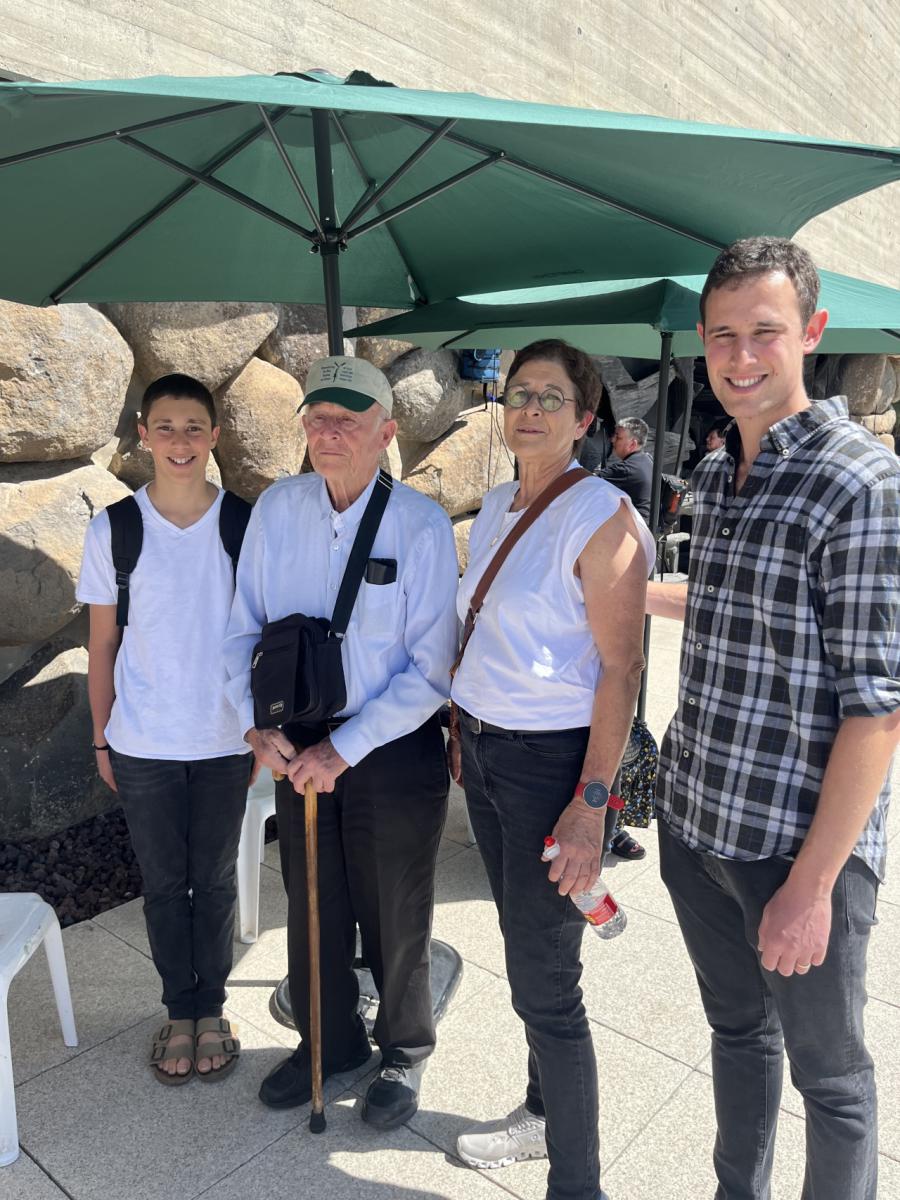

This year's activities marking Israel's Holocaust Martyrs' and Heroes' Remembrance Day began, as in year's past, with the Official State Opening Ceremony on the evening of 17 April 2023, with the participation of Holocaust survivors lighting the torches with members of their families and speaking on behalf of all the survivors worldwide. The following day, after the nationwide siren, Yad Vashem hosted the traditional Wreath-Laying, Names Reading and Youth Movement ceremonies – which concluded an emotional yet uplifting 24 hours on the Mount of Remembrance in Jerusalem.
Among the dignitaries, honored guests and members of the public who chose to spend this meaningful day at Yad Vashem were groups from Israel and around the world – survivors and their families, local students and visiting youth, Jewish and international groups. Each of them had different reasons for coming; each of them left with a range of feelings and renewed ideas for making an impact in their social circles and beyond.
From Generation to Generation
For many of the participants in the Wreath-Laying Ceremony, which this year changed its venue from the spacious Warsaw Ghetto Square to the more intimate and hallowed Hall of Remembrance, the most important message today is that Holocaust remembrance must be passed on to the next generations. Holocaust survivor Batsheva Levy from Greece spoke passionately about the necessity to involve young people in Holocaust remembrance – perhaps by "adopting" and learning about the different communities that were destroyed in Europe by the German Nazis and their accomplices during WWII – lest they be forgotten.
Yitzchak Perlmutter, a survivor from Hungary, was there with his daughter Orly and two grandsons, Matan and Ilai. Ilai described his great emotion at laying the wreath with his grandfather for the first time, on behalf of Hungarian Jewry decimated during the final months of the Holocaust. Yitzchak, who came to Israel in 1947, recalled coming to Yad Vashem each year with his mother – and so the chain of Holocaust remembrance continues to the Third Generation, and even beyond (Yitzchak winked that a great-grandchild was on its way). He appreciated the move to the Hall of Remembrance, which he found "easier to navigate, and more respectful."
German Visitors
A small group of Germans gathered in a shady spot in Warsaw Ghetto Square. The guide explained to them the sculpture by Nathan Rapoport at the far end of the square depicting the heroic uprising 80 years ago (the central theme for this year's Holocaust Remembrance Day), as well as the mass deportation of Jews to the death camps.
The visitors, who came from all regions of Germany, were between 40 and 60 years old. Not all of them knew before their visit that that very day would be Holocaust Remembrance Day in Israel, because in Germany the victims are remembered on the UN-sanctioned International Holocaust Remembrance Day on 27 January. "As Germans, it is a special honor to be here today," commented one woman.
A man cleared his throat as the group talked about antisemitism and group-based hatred. "Something similar to the Holocaust could happen again today, even if that is terrifying to consider," he claimed. One of the participants agreed, arguing that it is dangerous when people in Germany say they don't want to hear anything more about the horrors of the Holocaust because "it doesn't affect them. Even the Bible talks about generative responsibility," he explained. "The sins of the parents is passed on to the children, grandchildren and great-grandchildren." That makes it all the more important, the group agrees, that remembrance and education about the Holocaust continue, from generation to generation.
However, the visitors agreed that is not about assigning blame, but rather about accepting the responsibility that Germany and Germans carry, even today. "We walked through the museum, deeply impressed, of course," added another. "The worst thing is – all this was in the name of Germany. I am a German. That increases the consternation many times over. You can tell from my voice that I am still affected. No sensible person, no German, can ever distance himself from this feeling."
Youth Encounters
A group of students from the Gesher High School in Rehovot – an institution dedicated to the education of special needs youth – were honored to be among the visitors to the Mount of Remembrance. "It is important that our students come here, some of whom in order to remember their families who went through the Shoah," commented their teacher. "I am honored to be here today," said a student, proudly wearing his IDF uniform. "We need to remember what occurred then, and ensure that it can never happen again."
A Jewish youth delegation on a "Masa Olami" trip, many of whom were visiting Israel – and Yad Vashem – for the first time, also shared their thoughts. "It is important to understand everything," said one participant, "I'm happy to be here today of all days." When asked if they think another event such as the Holocaust could be repeated, they were adamant – some stated that in an age of social media, such a terrible event would be untenable, and others added that because of Israel and the IDF, the Jewish people is guaranteed security. "The sanctity of life is supreme," stated a young Russian. "Another Holocaust could never happen if we do not take the lives of others, but instead respect everyone for who they are." "We must never ignore dangerous situations that we think don't affect us," concluded a South American. "We must always stand up and speak out."
Isabell Knief contributed to the preparation of this article.










